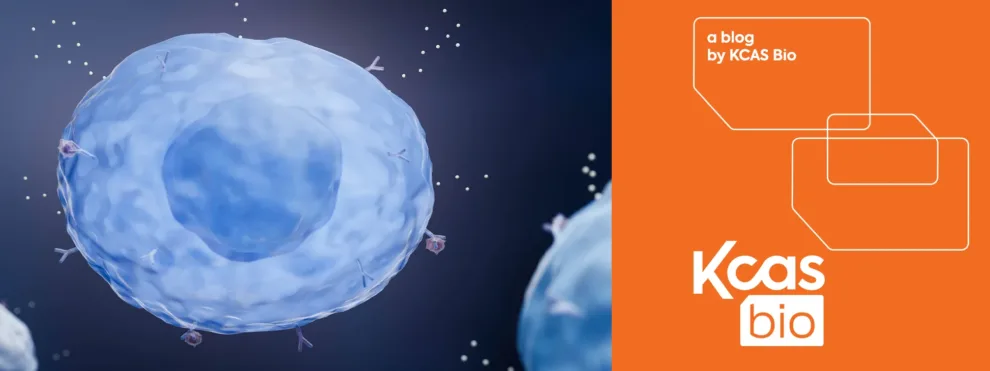Intracellular cytokine staining (ICS) is a functional immunology assay that uses flow cytometry to assess cytokine production by individual cells. Cytokines play a critical role in developing both physiologically appropriate and pathological immune responses. Interferon-γ (IFN-γ) is an excellent example of this, where it has a key role in antiviral and anti-tumor responses but can also exacerbate pathogenic autoimmunity in multiple sclerosis patients1. In this blog, we’ll provide a brief description of how an ICS assay is performed, discuss the advantages of using ICS to measure cytokine production compared to other methods, and provide examples of how the method can be applied to your research program.
How ICS Assays Work
To perform an ICS assay, live cells are stimulated either in vitro or ex vivo. Non-specific stimulation may be performed using signaling pathway activators such as PMA and ionomycin, or antigen-specific stimulation may be performed using peptides or whole proteins. During stimulation, cells are treated with a compound to inhibit protein secretion, such as Brefeldin A and/or monensin. This leads to the accumulation of cytokines within the Golgi body. Once the cells are permeabilized, the accumulated intracellular proteins can be detected by staining the cells with fluorescently labeled antibodies against target cytokines or cytotoxic granules.
Key Advantages of Intracellular Cytokine Assays
- Precise and Comprehensive: A single ICS assay can be used to determine the frequency, identity, and absolute number of cytokine-producing cells. Additionally, the amount of cytokine produced by each cell can be quantified to the exact number of molecules by using fluorescence standards. This makes ICS assays ideal for generating comprehensive and precise cytokine data.
- Robust and Specific: Unlike secreted cytokine assays such as ELISA or Luminex, ICS assays allow for precise identification of cytokine-producing cell subsets. With proper design, this assay yields information about the cellular origins of cytokines that are critical in the development of immune-mediated pathologies2 or in broader scope, can identify multi-potent cytokine producing cells that correlate with clinical outcomes in a variety of therapeutic areas.
- Flexible and Multiparameter: Flexibility is one of the many great advantages of flow cytometry-based assays. ICS assays are no exception to this. Cytokine analysis can be combined with immunophenotyping of surface biomarkers in a single assay. In fact, due to the multi-parameter nature of flow cytometry, ICS assays can be leveraged to provide deeper insight into antigen-specific cytokine responses. Since these assays can be tailored for cell stimulation with specific proteins or peptides, antigen-specific cytokine producers can be identified using a combination of intracellular staining and fluorescently conjugated tetramers or anti-idiotype antibodies.
Practical Applications of ICS Assays
- Functional Pharmacokinetics Cell Therapy Products: ICS assays by flow cytometry can allow for a thorough and targeted functional assessment of cell therapies throughout the course of treatment. When cell therapy monitoring is paired with an ICS method, the functional response of the cell therapy can be evaluated. Additionally, ICS assays allow for measurement of concurrent pharmacodynamic changes in patient immune cells, including monitoring of and can even be used to measure disease state in patients with hematological cancers.
- Cellular Immunity to Vaccines: In vaccine trials, humoral immunity has traditionally been emphasized over cellular immunity. However, the immune system’s ability to recognize and destroy infected cells is critical for protective immunity against viruses and intracellular bacteria. By stimulating mixed leukocyte populations with vaccine antigen(s), ICS assays can be used to measure the antigen-specific production of key antiviral cytokines, such as interferons, and key cytotoxic molecules like granzyme and perforin.
- Functional Pharmacodynamics for Immunotherapies: Immunotherapies frequently target key molecules for immune regulation, with the goal of producing specific responses. Utilizing ICS assays to monitor immune cell function allows for verification that drug-receptor binding is engaging the expected signaling pathways to modify functional responses. As with cell therapy products, pharmacodynamics can be monitored across multiple immune cell subsets for a comprehensive assessment of therapeutic efficacy.
KCAS Bio, Expertise in ICS Assays
If you’re looking to gain deeper insights into cytokine production, consider reaching out to learn more about our expertise in intracellular cytokine staining (ICS) assays. With their ability to provide precise, comprehensive data from cytokine-producing cells, ICS assays stand out as a powerful tool for functional immunology studies. Whether you are exploring cell therapy, vaccine responses, or immunotherapies, our experienced team can tailor an assay to meet your specific needs. Don’t miss the opportunity to enhance your research – connect with a us to explore how ICS can benefit your work today!
- Panitch HS, Hirsch RL, Schindler J, Johnson KP. Treatment of multiple sclerosis with gamma interferon: exacerbations associated with activation of the immune system. Neurology. 1987 Jul;37(7):1097-102. doi: 10.1212/wnl.37.7.1097. PMID: 3110648.
- Evans-Marin H, Rogier R, Koralov SB, Manasson J, Roeleveld D, van der Kraan PM, Scher JU, Koenders MI, Abdollahi-Roodsaz S. Microbiota-Dependent Involvement of Th17 Cells in Murine Models of Inflammatory Arthritis. Arthritis Rheumatol. 2018 Dec;70(12):1971-1983. doi: 10.1002/art.40657. PMID: 29975009; PMCID: PMC6587816.

